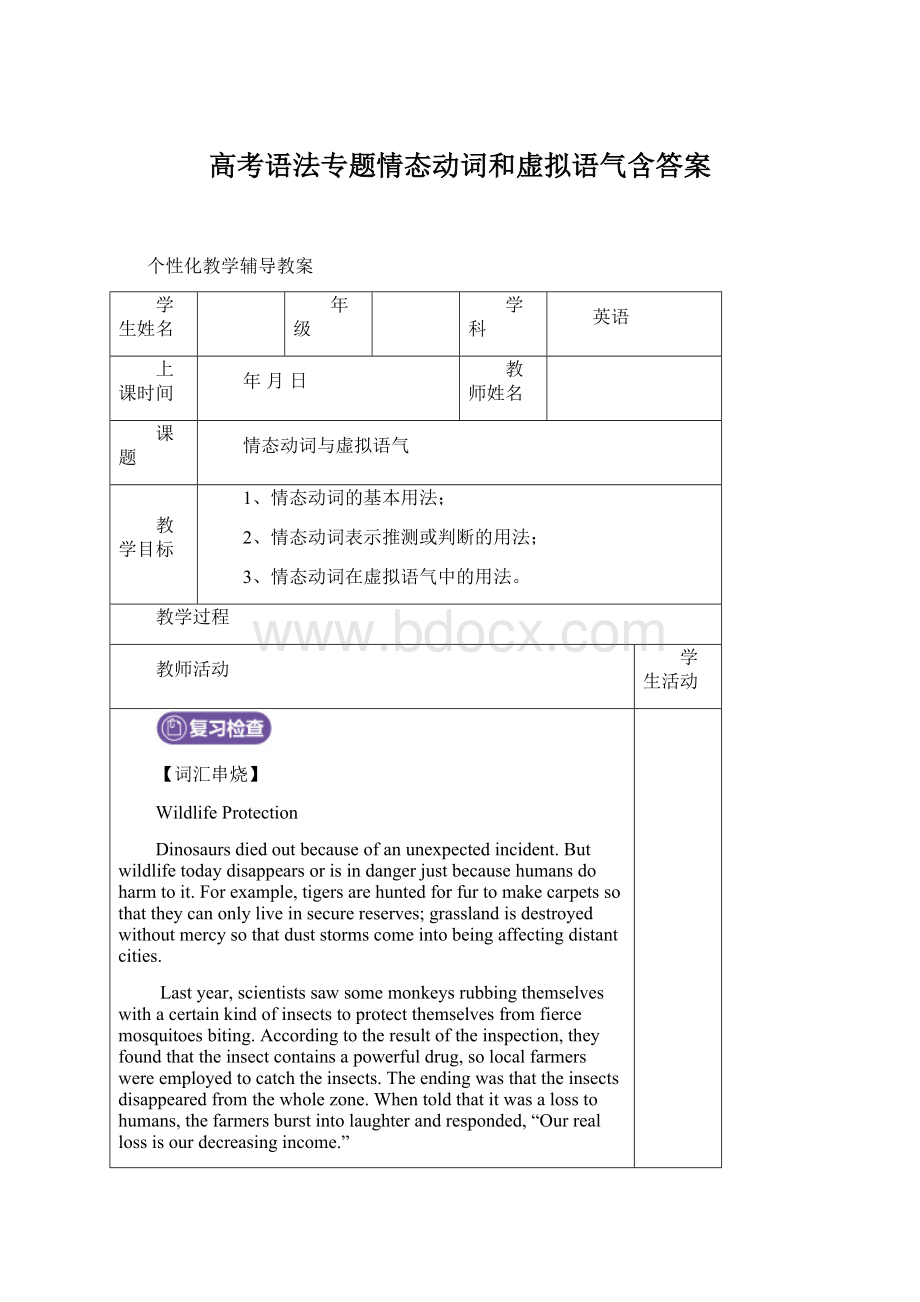高考语法专题情态动词和虚拟语气含答案Word下载.docx
《高考语法专题情态动词和虚拟语气含答案Word下载.docx》由会员分享,可在线阅读,更多相关《高考语法专题情态动词和虚拟语气含答案Word下载.docx(24页珍藏版)》请在冰豆网上搜索。

当被告知说这是整个人类的损失时,农民们都突然大笑着回应道:
“我们减少的收入才是我们真正的损失呢!
”
我们应该意识到自然平衡的重要,更加注意野生动植物的保护。
直到我们成功让野生动植物安详平静地生活,我们自己才能如释重负地笑开颜。
【词汇点拨】
wildlifen.野生动植物
protectionn.保护
wildadj.野生的;
野的;
未开发的;
荒凉的
decreasevi.&
vt减少;
(使)变小;
或变少
dieout灭亡;
逐渐消失
lossn.损失;
遗失;
丧失
reserven.保护区
huntvt.&
vi.打猎;
猎取;
搜寻
zonen.地域;
地带;
地区
inpeace和平地;
和睦地;
安祥地
indanger(of)在危险中;
垂危
carpetn.地毯
respondvi.回答;
响应;
做出反应
distantadj.远的;
远处的
furn.毛皮;
毛;
软毛
reliefn.(痛苦或忧虑的)减轻或解除;
减轻痛苦的事物
inrelief如释重负;
松了口气
laughtern.笑;
笑声
burstintolaughter突然笑起来;
大声笑了出来
mercyn.仁慈;
宽恕;
怜悯
certainadj.确定的;
某一;
一定
importancen.重要(性)
rubvt.擦;
摩擦
protect…from保护……不受……(危害)
mosquiton.蚊子
insectn.昆虫
containvt.包含;
容纳;
容忍
powerfuladj.强大的;
有力的
affectvt.影响;
感动;
侵袭
attentionn.注意;
关注;
注意力
payattentionto注意
appreciatevt.鉴赏;
感激;
意识到
succeedvi.成功vt.接替;
继任
secureadj.安全的;
可靠的
incomen.收入
employvt.雇用;
利用(时间、精力等)
harmn.&
vt.损害;
危害
bitevt.&
vi.(bit,bitten)咬;
叮;
刺痛
dinosaurn.恐龙
comeintobeing形成;
产生
inspectvt.检查;
视察
unexpectedadj.没料到的;
意外的
incidentn.事件;
事变
dustn.灰尘;
尘土;
尘埃
accordingto按照;
根据……所说
fierceadj.凶猛的;
猛烈的
sothat以致于;
结果
endingn.结局;
结尾
【考点精炼】
1、请根据各句上下文的意义,选择正确的单词填入空白处。
bite,wildlife,protection,affect,powerful,reserve,contain,zone,rub,effect,fierce,loss,mosquito,insect
1.Everyoneshouldrealizetheimportanceof__________protection,becausesomeanimalsareendangered.
2.Sunglassescanbea_________toyoureyesagainstthestrongsunlightonhotsummerdays.
3.WolongNature________,SichuanProvinceisonehometopandas.
4.ShenzhenSpecialEconomic_________wasfoundedin1980.
5._________aresmallcreatureswithsixlegsandabodydividedintothreeparts.
6.Freshfruitandvegetables________plentifulVitaminC.
7.Chinaisgettingmoreandmore________intheworld.
8.SexandviolenceinTVplays__________thedevelopmentofachild.
9.Peoplesaythatbarkingdogsdon’t________.
10.Atigerisavery_________kindofanimal.
11.Livingnearanairportmaycausethe________ofhearingsomeday.
12.Whynothanga________netoverabedtokeepthemawayfromyou?
13.Properwaysofeducatingkidswillhaveagood________ontheircharacterbuilding.
14.Pupilsareaskedto________outthemistakeiftheyfinditwrong.
2、把下列短语填入每个句子的空白处(注意所填短语的形式变化):
dieout
inpeace
indanger
protect…from
payattentionto
comeintobeing
1.Thenewcountry_________onlytwoyearsago.
2.Thegovernmentisdoingitsbestto_______thoserareanimals_______beinghunted.
3.Ihadwarnedhimofthepossibledanger,buthedidn’t
_______it.
4.Elephantswould_________ifmenareallowedtoshootasmanyastheywished.
5.Children’slivesare_________everytimetheycrosstheroad.
6.Thetwocommunitieslivetogether_________.
3、
一、用所学情态动词填空。
1.We______usethecomputernow,butwe__________useittwentyyearsago.
2.Mycarisoutofordernow.There________besomethingwrongwiththeengine.
3—Listen!
Helenissinginginthenextroom.
—It_______beHelen,ShehasgonetoBeijing.
4—_______weuseyourofficeforafewminutes?
—No,youmustn’t.Wewillhaveanimportantmeetingrightnow.
5.Hewasveryill,sohe________finishtheworkontime.
二、用下列所给词的适当形式填空。
1.Sorry,Iamtoobusynow.IfI(have)time,Iwouldcertainlygoforanoutingwithyou.
2.Ifwe(book)atableearlier,wecouldn’tbestandinghereinaqueue.
3.—DoyouthinkGeorgehaspassedthedrivingtest?
—No.Ifso,he(drive)hiscartoourcollegeyesterday.
4.IfwehadspentmoretimepracticingspeakingEnglishbefore,he(be)abletospeakitmuchbetternow.
5.Hadtheyknownwhatwascomingnext,they(have)secondthoughts
情态动词和虚拟语气用法掌握欠佳。
一、情态动词
Ⅰ.情态动词知识概要
情态动词是一种本身有一定的词义,表示说话人的情绪、态度或语气的动词,但不能单独作谓语,只能和其他动词原形构成谓语。
情态动词数量不多,但用途广泛,主要有:
can(could),may(might),must,need,oughtto,dare(dared),shall(should),will(would).
Ⅱ.情态动词的位置
情态动词在句中放在谓语动词之前,谓语动词前若有助动词,则在助动词之前,疑问句中,情态动词放在主语之前。
Icanseeyou.Comehere.我能看见你,过来吧。
Hemusthavebeenaway.他一定走了。
Howdareyoutreatuslikethat!
你怎么敢那样对待我们!
Ⅲ.情态动词的语法特征
1.情态动词除ought和have外,后面只能接动词原形。
2.情态动词没有人称,数的变化,即情态动词第三人称单数不加-s。
3.情态动词没有非谓语形式,即没有不定式,分词,等形式。
Ⅳ.情态动词的用法
(一)can;
could;
beableto
1.Can的用法
(1)表示“能力”(此时过去时是could)
Whatcanyoudo?
(2)表示许可、请求,“可以”。
在口语中,can可以代替may表示许可,而may比较正式。
(此时用could或might语气更委婉)
--Can/CouldIgonow?
--Yes,youcan.
(3)表示推测(否,疑),把握很大,could也可表推测(肯,否,疑),把握比can小。
--Look!
Someoneiscoming!
Whocanitbe?
--Itcan’tbehim.HehasgonetoParis.(不可能)
Hecouldbeheresoon.
(4)肯定句中客观存在的可能性。
“有时会,偶尔”
Itcanbequitewindythere,especiallyinspring.
2.Could的用法
(1)表示能力,can的过去式,过去能够
CouldyouspeakEnglishthen?
Lookingdownfromtheplane,wecouldseelightsontherunway.
(2)请求允许(委婉语气)(问句的答语不用could,而用can,)
Could[Can]Iuseyourpen?
”“Yes,ofcourseyoucan.”/No,I’mafraidnot.
(3)表示推测可能性(肯,否,疑)
Wecouldgotherethissummer.(将来可能性)
Youcouldberight,butIdon’tthinkyouare.(现在可能性)
(4)couldhavedone①对过去推测,可能已经。
。
②本来能够却没做,差点就
Hecan’t[couldn’t]haveseenherthere.他不可能在那儿见到她。
Hecouldhavegonehome.他可能已回家了
Hecouldhavetoldher,buthedidn’tchooseto.他本来可以告诉她的,但他却没有。
Youcouldaskmebeforeyouusemyphone.你打电话之前本来可以问我一声。
IwassoangryIcouldhavekilledhim.我是那样生气,差点把他杀了。
(5)can和beableto都可以表示能力,意思上没有区别,但can只有现在式和过去
式(could),而beableto则有更多的形式。
过去时:
were/wasableto将来时:
will/shallbeableto完成时:
have/hasbeenableto
★如果要表达将来的能力时,一般要用will/shallbeableto.
Nooneisabletodoit.
Weshallbeabletofinishtheworknextweek.
Ihaven’tbeenabletofinishthebook
☆Could与was/wereableto的区别:
could只表有能力,was/wereableto意含”
过去某时经过努力设法做成了某事”,还可以表示结果
Theyworkedhard,sotheywereabletodomoreforthecompany.
Hecouldcuretheoldman’sillness.(能治好)
Hewasabletocuretheoldman’sillness.(治好了)
(二)may和might
1.may的用法(过去式might)
(1)表示允许﹑许可,might提问更委婉。
口语中可用can/could.
---May/MightIwatchTVaftersupper?
---Yes,youmay./Yes,please./Certainly.
---No,youmustn'
t./No,youmaynot./No,youcan’t.
---No,you’dbetternot.
(2)表示推测(肯,否),有“或许”、“可能”的意思。
might把握更小。
疑问句用can/could
Hemayberight.
Iheartheremaybeafewcopiesleft.
Hemaycometoday(tomorrow).
Hemightcometoday(tomorrow).
(3)表示祝愿,倒装。
Mayyousucceed!
Mayyouhavemanymoredaysashappyasthisone.
2.might的用法
(1)may的过去式HesaidthatImightborrowthisbook.
(2)许可(委婉语气)MightI...
(3)表示推测(肯,否)“或许”“可能”把握比may小。
疑问句用can/could
Hemightgetthereintime,butI’mnotsure.
☆特殊结构;
may[might](just)aswell…
意为“不妨”、“还是…为好”等,用might比用may语气更委婉。
如:
I’mready,soImightaswellgonow.我已准备好,因此不妨现在就走。
There’snothingtodo,soImay[might]aswellgotobed.
(三)must,haveto
1.must的用法
(1)must表示“必须”。
否定式mustnot(mustn’t)表示“不应该”、“不许可”、“不准”、“禁止”等。
Everybodymustobeytherules.
Theworkmustbefinishedassoonaspossible.
Youmustn’tlendittoothers.
Youmustn’tspeaklikethattoyourmother.
☆在回答有“must”的询问时,否定式常用neednot(needn’t)/don’thaveto表示“不必”,而不用mustnot,因为mustnot表示“禁止”“不可以”
---MustIgonow?
---Yes,youmust.
---No,youneedn’t./No,youdon’thaveto.
(2)must表示推测(“一定”、“必定”),只用在肯定句中,其否定形式为can’t,表示“不可能”
Youmustbehungryafterthelongwalk.
TheChineselanguagemusthavethelargenumberofspeakers.
☆must+have+done,表示对过去事物的肯定推测。
“一定做过...”
Hemusthavetoldmyparentsaboutit.
(3)表示与说话人愿望相反及不耐烦.意为“偏要”.
-____youmakesomuchnoise?
(A)
-Sorry,Iwilltakecarenotto.
AMustBCanCMayDWould
(4)must和haveto的区别:
must表示说话人的主观看法,haveto“不得不,必须”,表示客观需要、客观条件只能如此。
haveto比must有更多形式。
mustn’t表示“决不能,禁止,一定不要”,而don’thaveto表示“不必要”.(英国英语常用needn’t).
Idon’tliketheTVset.Imustbuyanewone.(主观看法)
TheTVsetisbroken.Ihavetobuyanewone.(客观需要)
Hehadtospendhischildhoodinhardwork,helpinghisfatherontheirsmallfarm.
Youwillhavetodoitagain。
(将来)
(四)oughtto/should/shall
1.oughtto用于反映客观情况或涉及义务和规定时,常译作“应该”、“应当”(和should差不多,只是语气较强),有时表示非常可能的事情。